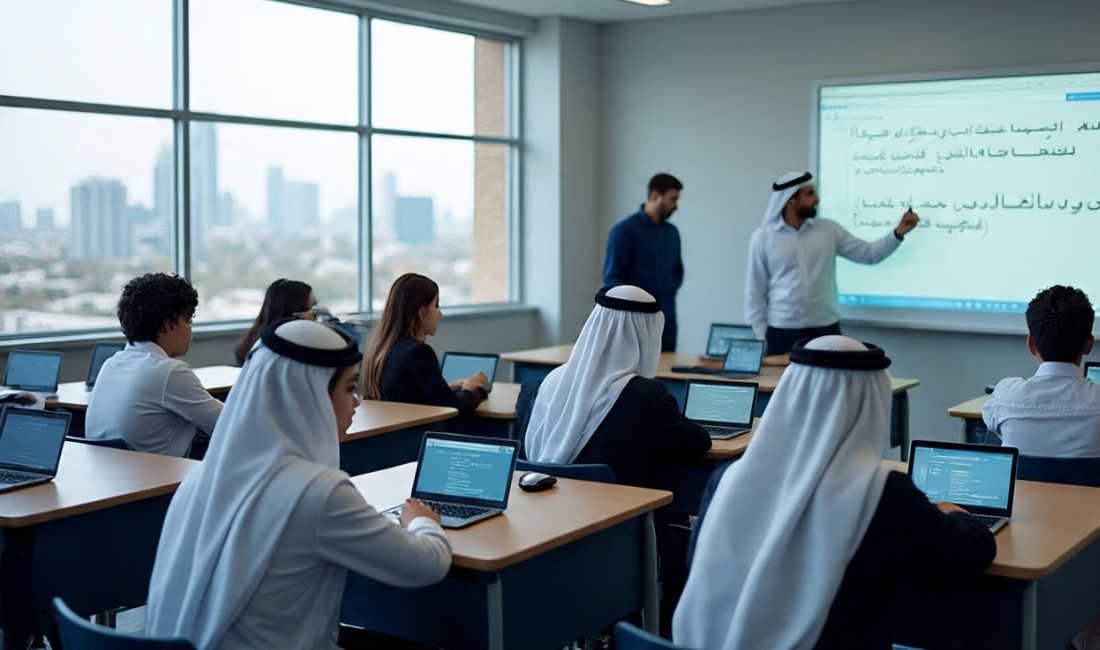UAE Leads GCC Push for AI Education and Workforce Upskilling

In 2025, the United Arab Emirates (UAE) has emerged as a regional leader in advancing artificial intelligence (AI) education and workforce development, setting the pace for the entire Gulf Cooperation Council (GCC). Through nationwide initiatives and cross-GCC collaborations, the country is rapidly training students, professionals, and government officials to prepare for an AI-driven future.
UAE AI Camp 2025: A Regional Training Hub
This summer, the National Programme for Artificial Intelligence and the National Programme for Coders concluded the seventh edition of UAE AI Camp, a flagship initiative designed to spread AI knowledge across all age groups.
Running from mid-July to mid-August 2025, the camp featured 70+ knowledge sessions and workshops, including nine virtual programs, hackathons, and coding challenges. Participants ranged from schoolchildren to university students, young professionals, and AI experts.
Key themes included:
- Future trends in artificial intelligence
- Data science and machine learning fundamentals
- AI applications in education, healthcare, and finance
- Robotics and web development
- Cybersecurity and ethical AI governance
These sessions not only introduced technical skills but also explored critical issues such as AI ethics, policy frameworks, and responsible deployment, areas that are gaining importance as governments and businesses integrate AI into core operations.
GCC Collaboration for AI Readiness
A highlight of the 2025 camp was its partnership with the GCC General Secretariat, which hosted two specialized workshops aimed at strengthening AI preparedness across the Gulf.
The sessions focused on:
- Understanding AI technologies and emerging “AI agents” capable of autonomous decision-making
- Evaluating global case studies to identify best practices in government and private sector adoption
- Strategies for building AI-ready institutions through workforce training and cross-border cooperation
This collaboration reflects a broader GCC commitment to create shared standards and accelerate AI adoption, while balancing innovation with ethical considerations.
Workforce Upskilling Gains Momentum
The UAE’s private sector is also moving quickly to close the AI skills gap. Surveys from regional tech research groups indicate that a growing number of companies are investing heavily in AI training:
- Over 80% of UAE professionals now use AI tools regularly, up sharply from 2024.
- A majority of companies plan to hire AI-specialized staff or retrain employees within the next 12–18 months.
- Many organizations have already introduced internal AI courses, with some reporting that a significant portion of their workforce has received structured training in generative AI and data analytics.
These efforts align with the UAE’s national AI strategy, which emphasizes building local talent pipelines to reduce dependence on imported expertise.
Governance and Ethical Priorities
While the region embraces rapid AI growth, the UAE is also shaping the governance conversation.
Rather than rushing to impose strict regulations, GCC governments, including the UAE, are promoting “soft regulation” frameworks. These guidelines focus on ethics, transparency, and responsible deployment while leaving room for innovation.
The UAE AI Camp’s inclusion of policy and governance modules highlights the importance of balancing technological progress with accountability and public trust.
A Model for the GCC’s Digital Future
By combining large-scale education initiatives with regional partnerships and industry engagement, the UAE is creating a template for AI adoption across the Gulf.
Its proactive approach, training youth, reskilling professionals, and aligning policy with innovation, positions the country not only as a hub for AI talent but also as a key driver of GCC-wide digital transformation.
As AI reshapes global economies, the UAE’s strategy offers a glimpse of how nations can simultaneously build skills, craft governance, and nurture innovation, ensuring that the region remains competitive in the rapidly evolving AI economy.





